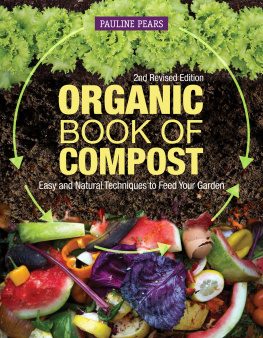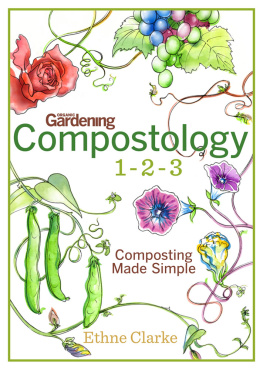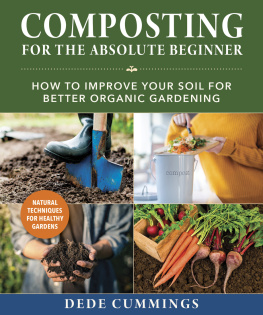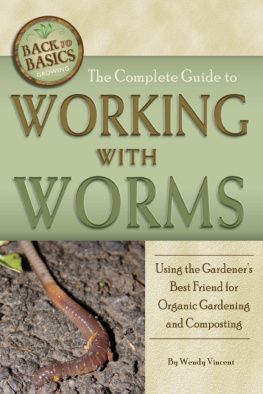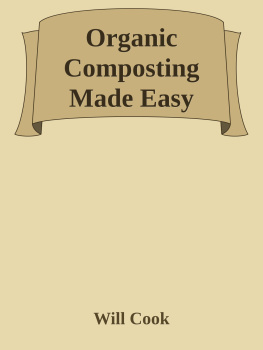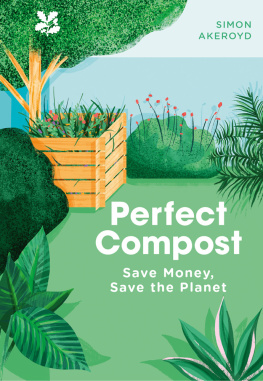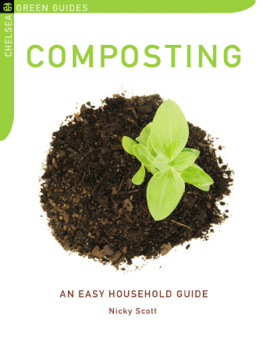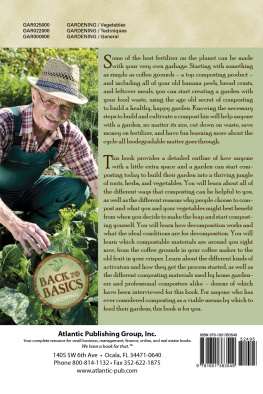Contents
Guide


Published 2020IMM Lifestyle Books
www.IMMLifestyleBooks.com
IMM Lifestyle Books are distributed in the UK by Grantham Book Service, Trent Road, Grantham, Lincolnshire, NG31 7XQ.
In North America, IMM Lifestyle Books are distributed by Fox Chapel Publishing, 903 Square Street, Mount Joy, PA 17552, www.FoxChapelPublishing.com.
2011, 2020 by Garden Organic and IMM Lifestyle Books
Produced under license.
Organic Book of Compost, 2nd Revised Edition (2020) is a revised edition of The Garden Organic Book of Compost (2011), originally published by New Holland Publishers (UK) Ltd. No part of this publication may be reproduced, stored in a retrieval system or transmitted, in any form or by any means, electronic, mechanical, photocopying, recording or otherwise, without the prior written permission of Fox Chapel Publishing.
Print ISBN 978-1-5048-0123-2
eISBN: 978-1-6076-5786-6
The Cataloging-in-Publication Data is on file with the Library of Congress.
We are always looking for talented authors. To submit an idea, please send a brief inquiry to .
This book has been published with the intent to provide accurate and authoritative information in regard to the subject matter within. While every precaution has been taken in the preparation of this book, the author and publisher expressly disclaim any responsibility for any errors, omissions, or adverse effects arising from the use or application of the information contained herein.

CONTENTS
INTRODUCTION
Composting makes the world go round. It recycles the nutrients that make plants (and animals) grow, feeds the bugs that keep the soil healthy and is a sustainable, low-cost way of dealing with rubbish that rots. And it can be fun too.
Looking at a handful of compost you might wonder what all the fuss is about. How could a whole book be written about something that looks like dirt. How can people be so passionate about a process that goes on in the natural world all the time? We hope that by the time you have made your first batch of compost you will be equally inspired or at the very least feel that it is something worth doing again.
WHAT IS GARDEN COMPOST?
It is important to be clear about what is meant by the word compost. Compost, which looks like a rich dark-brown soil, is a product that results from the slow decomposition of plant and animal matter by living organisms. It is natures way of recycling the nutrients that exist in all living plants and animals and returning them to the soil to enrich and feed further generations of flora and fauna.
Compost is not the same as the seed, potting and multi-purpose composts on sale in garden shops. These, which are more correctly called growing media, are carefully formulated mixtures, designed for the specific purpose of raising and growing plants.
Compost-making is for everyone. You dont need to be a keen gardener or have a science degree the advice and instructions in this book are given in clear and simple terms.
A METHOD FOR EVERY SITUATION
Compost can be made in back yards, small or large gardens, school playgrounds, and on balconies and boats. This book has methods to suit every situation including cool heaps, worm composting, Bokashi treatment and compost tumblers. There are also techniques to fit a range of lifestyles. Some composting methods involve little time and effort, while others can be turned into an enjoyable hobby. Choose the one that suits you and your family best; composting can be a great activity for children too. If you are new to composting, this book will show you how to get started, using a method that suits the range of items that you have available to compost. Within the chapter entitled Getting Started there is a flow chart to help you choose the method that suits your circumstances (see ). If you have already tried making compost and are not satisfied with the results, this book will help you to work out what you need to do to achieve your aims.

Composting need not involve much work. Heap suitable materials into a compost bin and let nature do the rest.

Compost is such wonderful stuff that it is often referred to as black gold.
There is a chapter on composting containers and where to put them, a chapter devoted to worm composting, and one on other techniques and treatments with full instructions on how to proceed. There is also a chapter focused on the helpful creatures that live in your compost and how they do their work.
Can I compost it? is a frequently asked question. At the heart of this book is an invaluable chart to refer to when you are unsure if a particular item is suitable for composting. This list might also encourage you to compost and recycle items that you might not have thought of before (see What can I compost ).
Making compost, leaf mold and so on should not be an end in itself. The recycling process is only really complete when the product is put back on to the soil (or into your pots and containers), and the plant foods it contains are used again by growing plants. This book also includes advice on how to make best use of the products you have made.

A handful of worm compost will pep up a hanging basket.
GARDEN ORGANIC
This book has been written by a team of experts at Garden Organic, the UKs charity for organic gardening. The organization, founded as the Henry Doubleday Research Association (HDRA) by Lawrence D. Hills, has been promoting organic gardening in homes, communities and schools since the 1950s.
Compost-making is at the heart of organic gardening, where the aim is to minimize the need to use outside resources and materials, and reduce the risk of polluting the wider environment. Developing biodiversity in the garden is also a key feature of organic gardening. Treating the soil with compost helps to increase biodiversity in the soil, which helps to maintain soil health. It has even been shown to help plants resist some pests and diseases. No surprise then that Garden Organic has been promoting composting for over 60 years. The charity works with individuals, communities, schools and care providers, helping them with practical advice on how to develop gardening projects and grow organically. We also house the Heritage Seed Library. This collection conserves rare vegetable varieties that are no longer commercially available. To support the charity or become a member visit www.gardenorganic.org.uk.
Garden Organic has been a major player in the modernization of home composting. Its work giving advice and training advisors has helped thousands of people make compost successfully. Garden Organic also established the Composting Association for large and industrial-scale composting. Now an independent organization, the Organics Recycling Group works with the huge industry that composting has become.

